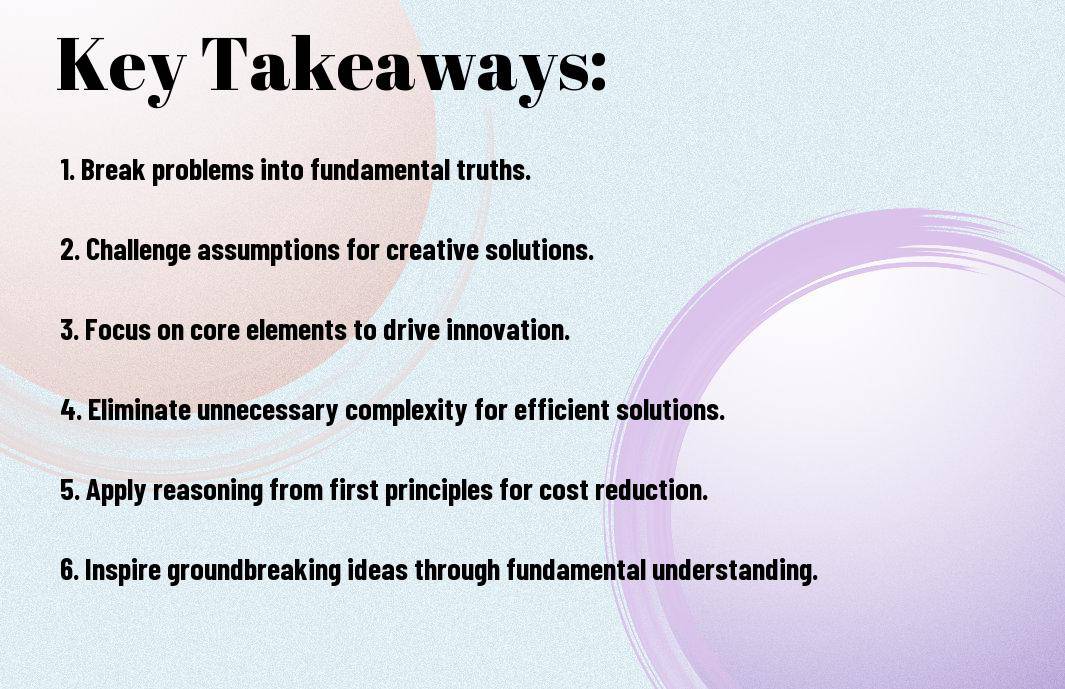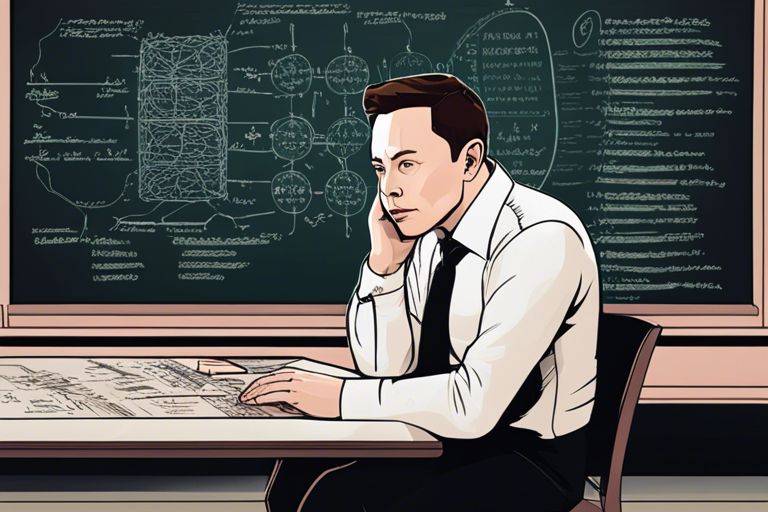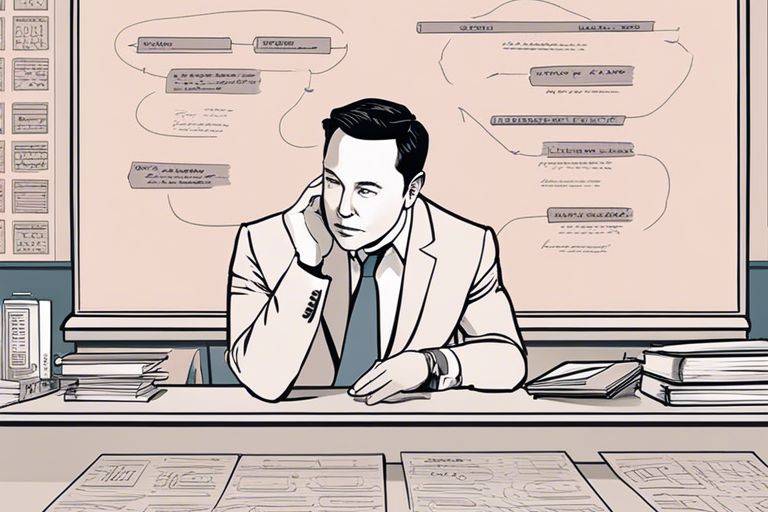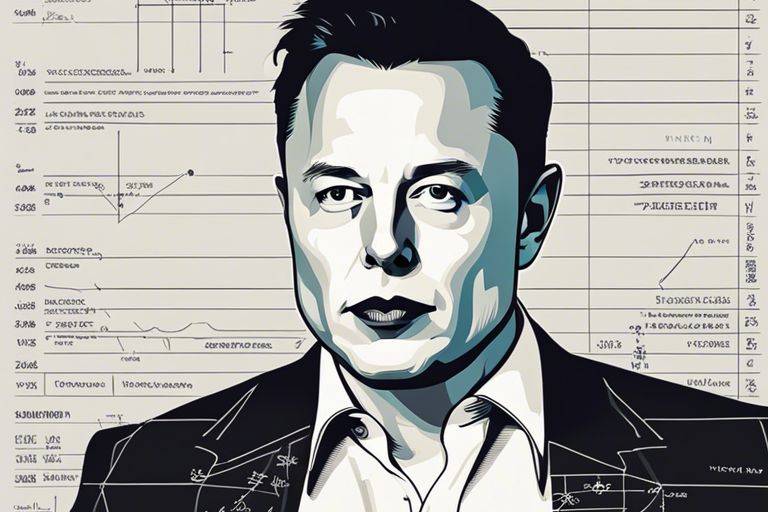First Principles Thinking! Many know Elon Musk as a visionary entrepreneur who has revolutionized several industries with his innovative thinking. One of the key strategies that sets Musk apart is his use of first principles thinking. This approach involves breaking down complex problems to their fundamental truths and building solutions from the ground up, ultimately enabling Musk to minimize costs and unleash groundbreaking innovations.
Key Takeaways:
- Breaking down problems: First Principles Thinking involves breaking down complex problems into basic principles to truly understand the root cause.
- Challenging assumptions: Elon Musk advocates challenging existing assumptions and not accepting things at face value.
- Minimizing costs: This approach helps in finding innovative solutions that can significantly reduce costs in manufacturing and design processes.
- Enhancing creativity: By focusing on fundamental truths, First Principles Thinking can lead to more creative and out-of-the-box ideas.
- Paving the way for innovation: Musk’s approach has been instrumental in the innovation of Tesla cars, SpaceX rockets, and other groundbreaking projects.
- Encouraging problem-solving: It promotes a problem-solving mindset by questioning established norms and exploring new possibilities.
- Applicability beyond tech: First Principles Thinking is a versatile approach that can be applied in various industries beyond technology and engineering.

The Roots of First Principles Thinking
Definition and Origins of First Principles
Some of the most innovative minds in history have practiced first principles thinking as a way to break down complex problems and create revolutionary solutions. This method involves deconstructing problems into their fundamental parts and rebuilding them from the ground up. By focusing on the fundamental truths or core elements of a problem, individuals can uncover new possibilities and innovative solutions.
Historical Figures and First Principles
Roots of first principles thinking can be traced back to ancient Greek philosophers like Aristotle who believed in breaking down problems into fundamental truths. However, it was the philosopher René Descartes who formalized the concept of first principles in the 17th century. Descartes emphasized the importance of starting with self-evident truths as the foundation for reasoning and problem-solving.
Principles of first principles thinking were further developed by great thinkers like Isaac Newton and Marie Curie, who challenged conventional wisdom and expanded human knowledge by questioning existing assumptions and beliefs. These historical figures demonstrated the power of approaching problems from first principles, leading to groundbreaking discoveries and innovations.
Origins
The origins of first principles thinking lie in the questioning of established knowledge and beliefs. By challenging existing assumptions and starting from basic truths, individuals can uncover new possibilities and innovative solutions that can revolutionize industries and change the world.
Elon Musk’s Interpretation of First Principles
Keep
Distilling Problems to Fundamental Truths
Fundamental to Elon Musk’s approach is the concept of first principles, which involves breaking down a problem to its most basic elements and building up solutions from there. Musk believes that by distilling complex issues to fundamental truths, one can gain a deeper understanding of a problem and create innovative solutions that have not been explored before. This method allows him to challenge conventional thinking and find new ways to address challenges.
Contrast with Analogy-Based Thinking
On the other hand, analogy-based thinking relies on drawing parallels with existing solutions or ideas to tackle a problem. This approach can be limiting as it may prevent one from exploring entirely new concepts or possibilities. Musk contrasts this with first principles thinking, emphasizing the importance of starting from scratch and questioning assumptions to achieve breakthrough innovations.
Contrast: Musk’s rejection of analogy-based thinking highlights the risk of being constrained by preconceived ideas and solutions. By urging to go back to first principles, Musk encourages a more profound exploration of problems and the potential for groundbreaking advancements.
First Principles in Business
After applying the first principles approach in various industries, Elon Musk has highlighted its significance in business as well. By breaking down complex problems into their fundamental truths, companies can revolutionize their operations and drive innovation. This method challenges traditional thinking by encouraging businesses to examine deep into the core components of their operations, challenging assumptions, and finding new solutions.
Rethinking Assumptions in the Business Context
With first principles thinking, businesses can question long-standing assumptions that may be limiting their growth potential. For example, instead of accepting industry norms without scrutiny, companies can evaluate each aspect of their processes to identify inefficiencies and areas for improvement. By challenging assumptions and norms, organizations can unlock new possibilities for optimization and innovation.
Cutting Costs through Innovative Methods
Methods such as leveraging technology, streamlining processes, and optimizing the supply chain can significantly reduce operating expenses without compromising quality. Implementing automation, adopting data-driven decision-making, and exploring alternative sourcing strategies are some approaches that can help businesses optimize their cost structures. By embracing innovative methods to reduce costs, organizations can enhance their competitiveness and profitability in the market.
The pursuit of cost reduction through innovative methods requires a shift in mindset and a willingness to challenge the status quo. Businesses that prioritize efficiency and creativity in cost management are better equipped to navigate challenges and capitalize on new opportunities in the ever-evolving business landscape.

Application in Technology and Engineering
SpaceX – Revolutionizing Space Travel
Many technological advancements have been made possible through Elon Musk’s application of first principles thinking in SpaceX. With a focus on reusability and cost-effectiveness of space travel, SpaceX has revolutionized the aerospace industry. By breaking down complex problems into fundamental truths, SpaceX has successfully developed and launched the Falcon rockets, drastically reducing the costs associated with launching payloads into space. This approach has not only made space travel more accessible but has also pushed the boundaries of innovation in rocket technology.
Tesla – Advancements in Electric Vehicles and Energy Storage
Revolutionizing the automotive industry, Tesla has leveraged first principles thinking to make advancements in electric vehicles and energy storage. By challenging the conventional norms of the industry, Tesla has developed cutting-edge electric vehicles that have redefined the standards of performance, range, and sustainability. The company’s Gigafactories have enabled them to scale up production and drive down costs, making electric vehicles more affordable and accessible to the masses.
The advancements in electric vehicles and energy storage by Tesla have not only disrupted the automotive sector but have also set new benchmarks for sustainability and innovation in the transportation industry.

First Principles and Creative Problem Solving
Your first principles are the basics, the foundational propositions or assumptions that cannot be deduced from any other assumption. By breaking down problems to their fundamental truths and reasoning up from there, you can unlock innovative solutions that might have otherwise been overlooked. This is the approach that tech visionary Elon Musk has adopted to revolutionize industries like space travel and electric vehicles.
Identifying and Overcoming Cognitive Biases
To foster creative problem solving, it’s crucial to recognize and address cognitive biases that can cloud judgment and hinder innovation. Biases such as confirmation bias, availability heuristic, and anchoring effect can negatively impact decision-making processes. By acknowledging these biases and consciously working to override them, you can approach problems with a clearer, more objective mindset. This self-awareness is key to generating novel ideas and groundbreaking solutions.
The Process of Logical Reasoning
Overcoming cognitive biases is imperative, but it is equally important to follow a structured process of logical reasoning. This involves breaking down complex problems into manageable parts, analyzing each component, and using sound logic to derive conclusions. By systematically evaluating information and drawing inferences based on evidence, you can arrive at innovative solutions rooted in strong foundations.
It’s critical to apply this logical framework consistently to ensure that your solutions are not only creative but also robust and sustainable. By combining first principles thinking with a methodical approach to reasoning, you can maximize your problem-solving capabilities and drive true innovation.
Challenges in Applying First Principles Thinking
The Difficulty of Ignoring Precedents
Unlike traditional problem-solving methods that rely on existing solutions and experiences, first principles thinking challenges individuals to deconstruct problems from fundamental truths. This approach requires disregarding conventional wisdom, industry standards, and historical practices, which can be a significant challenge for many individuals.
Difficulty arises when individuals struggle to break free from the constraints of past solutions and precedents. Ignoring precedents demands a shift in mindset that embraces uncertainty and discomfort, as individuals must confront the unknown and explore unconventional paths to arrive at innovative solutions.
Persistence and Discipline Required
One of the key obstacles in applying first principles thinking is the level of persistence and discipline required to dissect problems to their core components. Elon Musk’s approach emphasizes the need for continuous questioning and refinement of assumptions to build a solid foundation for innovative solutions. This process demands a high level of intellectual rigor and a willingness to endure the challenges that come with rethinking problems from scratch.
One must be dedicated to the meticulous process of breaking down complex issues into their fundamental elements, persistently seeking deeper insights, and maintaining discipline in challenging assumptions and exploring new possibilities.

Learning from Elon Musk’s Methodology
Incorporating First Principles into Daily Decision Making
For Elon Musk, incorporating first principles thinking into daily decision making is a key aspect of his methodology. Instead of relying on analogies or past experiences to make decisions, Musk breaks down problems to their fundamental truths and builds solutions from the ground up. By stripping away assumptions and preconceived notions, Musk is able to achieve truly innovative and cost-effective solutions.
Encouraging a Culture of Innovation
Musks leadership style encourages a culture of innovation within his organizations. He promotes a mindset of challenging the status quo and pushing boundaries to achieve breakthroughs. Musk values creative thinking and fosters an environment where employees are encouraged to think critically, take risks, and come up with bold ideas.
This approach has led to the development of revolutionary technologies such as reusable rockets at SpaceX and electric vehicles at Tesla. By fostering a culture of innovation, Musk empowers his teams to think outside the box and drive progress in ways that were previously thought impossible.
Summing up
As a reminder, the application of First Principles Thinking, inspired by Elon Musk’s approach, offers a powerful method for cutting costs and fostering innovation. By breaking down complex problems into their fundamental components and reconstructing solutions from the ground up, organizations can achieve truly groundbreaking results. This method challenges assumptions and promotes creativity while enabling companies to design more efficient and cost-effective solutions.
To learn more about the First Principles approach and how Elon Musk has successfully utilized it to revolutionize industries, you can visit First Principles: Elon Musk Method of Thinking –.
FAQ
Q: What is First Principles Thinking?
A: First Principles Thinking is a method of reasoning that breaks down complex problems into basic elements and then reassembles them from the ground up.
Q: How does Elon Musk use First Principles Thinking?
A: Elon Musk applies First Principles Thinking to challenge conventional wisdom, question assumptions, and create innovative solutions in his businesses.
Q: Why is First Principles Thinking important for minimizing costs?
A: First Principles Thinking helps identify the fundamental cost drivers of a product or service, enabling businesses to find more efficient and cost-effective solutions.
Q: How can First Principles Thinking lead to innovation?
A: By deconstructing problems and approaching them from first principles, individuals can uncover new opportunities for innovation and disrupt traditional ways of thinking.
Q: What are the steps involved in applying First Principles Thinking?
A: The steps include breaking down the problem into its fundamental components, questioning assumptions, reasoning from first principles, and reassembling the elements to find creative solutions.
Q: How can individuals learn to use First Principles Thinking?
A: To develop First Principles Thinking skills, individuals can practice deconstructing problems, challenging assumptions, and thinking critically about the fundamental building blocks of a problem or idea.
Q: What are the benefits of using First Principles Thinking in business?
A: The benefits include greater innovation, cost savings, improved problem-solving skills, and the ability to challenge the status quo to drive meaningful change and progress.
Dive Deeper: Further Explorations for Your Journey
The 10-Minute Rule – A Method to Overcome Procrastination by Starting Small
Learning to Say No – The Importance of Prioritizing Tasks and Commitments
SMART Goals – George T. Doran’s Method for Setting Clear and Achievable Goals



